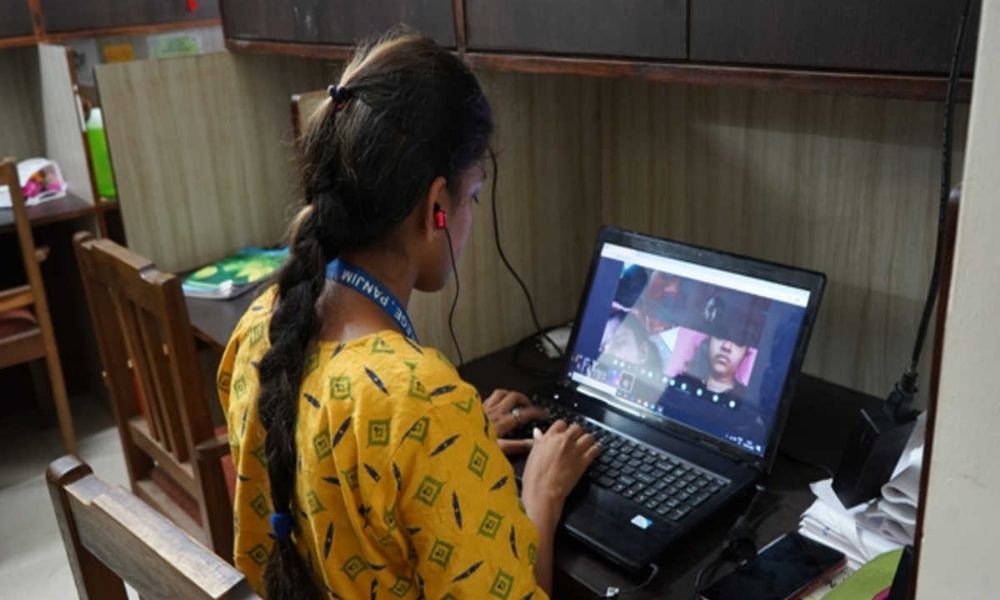
Image Credits: TheTimes of India
Online Fatigue, Digital Divide Affecting Children's Learning Amid Pandemic
India, 19 May 2021 6:59 AM GMT | Updated 19 May 2021 7:22 AM GMT
Editor : Shubhendu Deshmukh |
Shubhendu, the quint essential news junky, the man who loves science and politics in equal measure and offers the complete contrast to it by being a fan of urdu poetry as well.
Creatives : Shubhendu Deshmukh
Shubhendu, the quint essential news junky, the man who loves science and politics in equal measure and offers the complete contrast to it by being a fan of urdu poetry as well.
According to a 2019 government study, only 24 per cent of the urban households and four per cent of rural households have internet access thus amplifying an existing digital divide between rural and urban India.
Several schools were forced to shut due to the nationwide lockdown last year amid the first wave of the COVID-19 pandemic. With the sudden jump from offline to online form of education, teachers and students found it difficult due to perform their duties due to poor network. This year, CBSE 10th and 12 boards cancelled, state examinations postponed, and schools and colleges shut down once again amid the second wave.
The shift to online classes was slow as most schools never thought that the lockdown would last for more than three months. When the state governments realized that that virtual learning would be the new normal, some governments decided to shift their learning to public platforms such as tv such as Kerala or provide free internet plans to students during their exams such as Tamil Nadu who provided free internet of 2GB for college students.
Digital Divide
According to a 2019 government study, only 24 per cent of the urban households and four per cent of rural households have internet access, thus amplifying an existing digital divide between rural and urban India, IndiaToday reported. Many children in rural areas dropped out of schools due to the lack of internet access. This could influence the Indian economy in the long run as a generation of Indians would be uneducated and further unemployed due to the education gap. A report conducted by the World Bank called 'Beaten or Broken: Informality and COVID-19' showed that India would be bound to lose $440 billion dollars in earnings as a generation of students miss out on learning due to the digital divide or other means. Other stakeholders in the education system, such as teachers, are also suffering as they struggle to transition into the online mode of education.
Online Fatigue
The continued virtual learning has created online fatigue for both teachers and students alike. Many students have become less social by spending more time on their devices. "It's very tiring because even during this pandemic, when thousands are dying every day, we're constantly worrying about assignments and deadlines," said Jeevan K Raj, a student of Christ University, Bangalore. "Including mental health awareness as a part of the university curriculum will start a change by creating a safe space for students to convey their fears and anxieties and act upon it," he added.
Teachers also are tired as they face difficulties in transitioning into an online medium. "Online classes have definitely caused a lot of fatigue to us due to lots of screen time and extra energy and planning required to ensure an effective and engaging learning process for the students. We also have so many meetings that happen virtually for administrative tasks that make it tougher. It eats a lot into our personal time, and it's difficult to maintain the work-life balance. We seem to have less time for family and even ourselves," said Joel M Jacob, assistant professor of Media Studies at Christ University, Bangalore.
"Keep the syllabus simple. Don't overdo online games and activities. Students have equal responsibility to ensure learning happens. Provide topics and activities that help the students think, have fun, create and reflect. Create a syllabus where the students can make meaningful connections with the world and what's happening around them. Make a mix of voice, text, visuals and if possible kinesthetics for teaching, learning and evaluations," Prof Joel added.
Also Read: Delhi To Lose Three Iconic Buildings For Central Vista Project: All You Need To Know
 All section
All section













